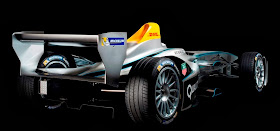There's new Formula racing series in town, and it consumes no fuel, and it is coming to Malaysia. To be specific, Putrajaya has been chosen as one the venue, set to host a second round of Formula E Championship in October 2014. It will be road circuit, design around Putrajaya although details are scarce the moment.
Formula E is the new racing series under FIA. The design guideline is highly regulated although manufacturer are encourage to come up with the own design. Many items are standardize, while other are constraint (for example maximum power and top speed). Tyres will be an all-season, eliminating the use of dry and wet weather tyres. Vehicles aerodynamics are specially crafted to aid overtaking, preventing another slipstream-limited not unlike the Formula One cars. All electric powertrain is set to give it a new breed of racing sound. Listen to the video below and judge for yourself. I feel it sound like an RC car, albeit in gigantic scale.
At the moment there are already 4 teams registered namely Drayson Racing, China Racing, Andretti Autosport and Dragon Racing. The calendar will consist of 10 rounds and Malaysia, as mentioned earlier is second is the series.
Those with technical insight, below is the technical specification of the car, extracted from FIA website. Read more after the jump.
Dimensions
- Overall length: 5000mm (max)
- Overall width: 1800mm (max)
- Overall height: 1250mm (max)
- Track width: 1300mm (min)
- Ride Height: 75mm (max)
- Overall weight (inc driver): 800kg (min) // Batteries alone 200kg
Power
- Max power (limited): 200kw, equivalent to 270bhp
- Race mode (power-saving): 133kw, equivalent to 180bhp
- 'Push-to-Pass': 67kw
Maximum power will be available during practice and qualifying sessions. During races, power-saving mode will apply with the 'Push-to-Pass' system temporarily allowing maximum power for a limited time.
The amount of energy that can be delivered to the MGU by the RESS is limited to 30kwh. This will be permanently monitored by the FIA.
The amount of energy that can be delivered to the MGU by the RESS is limited to 30kwh. This will be permanently monitored by the FIA.
Performance
- Acceleration: 0 - 100 km/h (0-62mph) in 3s - Estimated
- Maximum speed: 225 km/h (FIA limited) - Estimated
Final performance figures are still to be verified.
Engine
- MGU by McLaren
- Maximum of two MGU's allowed
- MGU's must be linked only to the rear axle
- The use of traction control is forbidden
Traction battery
- The traction battery is a Rechargeable Energy Storage System (RESS) and supplies electric energy to the Power Circuit and thus to the traction motor. Any onboard battery electrically connected to the Power Circuit is considered to be an integral part of the vehicle's traction battery
RESS
- A Rechargeable Energy Storage System (RESS) is a system that is designed to propel the car via the electric motor. In order to comply they must be:
- FIA Standard
- The maximum weight of the Battery Cells and/or Capacitor of the RESS must not be higher than 200kgs
- All Battery Cells must be certified to UN Transportation Standards as a minimum requirement
Chassis
- Chassis / Survival cell - Carbon/aluminium honeycomb structure made by Dallara
- Front and rear wing - Carbon structures and Aero styling by Dallara
- Bodywork - Carbon - Kevlar honeycomb structures made by Dallara
Gearbox
- Hewland paddle shift sequential gearbox
- Fixed gear ratios to reduce costs
Brakes
- Standard two separate Hydraulic systems, operated by the same pedal
- Brake material is free choice
- Calipers; the section of each caliper piston must be circular
The body of the callipers must be made from aluminium alloy
Wheels & tyres
- Bespoke 18" treaded Michelin tyres for use on both wet and dry conditions/surfaces
- Championship specific wheel dimensions
- O.Z. Racing Magnesium rims. Max width front - 260mm / rear 305mm. Max Diameter - front 650mm / rear 690mm
Electronics
- McLaren Electronics ECU/GCU including data logging system
- Power supply management unit
- CAN data acquisition pre-equipment
- FIA Marshalling system
- Beacon receiver
- Telemetry is not permitted
Suspension
- Double steel wishbones, pushrod operated, twin dampers and torsion bars suspension (front) and spring suspension (rear)
- Adjustable ride height, camber and toe
- Two way (front) / Four way (rear) adjustable Koni dampers
- Adjustable anti-roll bar (front/rear)
Steering system
- Non assisted rack and pinion steering system (power assistance is allowed)
- Steering wheel with dashboard, marshalling display, gear change and clutch paddles
Safety
- FIA safety standards including: front, side, rear and steering column impact tests
- Front and rear roll hoop, impact structures and monocoque push tests
- Anti-intrusion survival cell protection panels
- Wheel retainer safety cables
- Extinguisher system (electronically operated)


No comments:
Post a Comment
Share you thought?